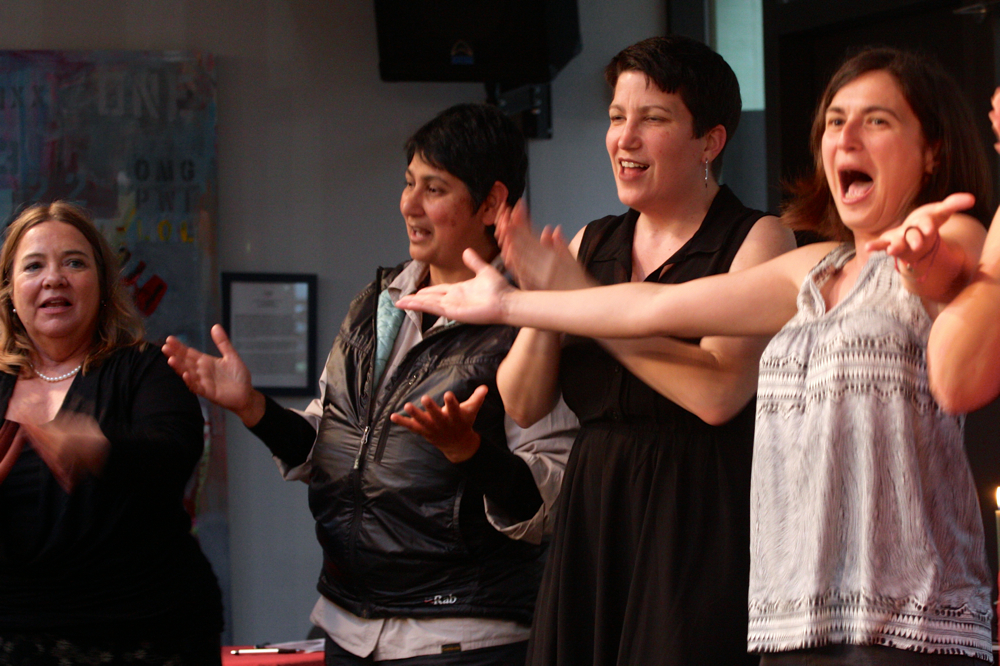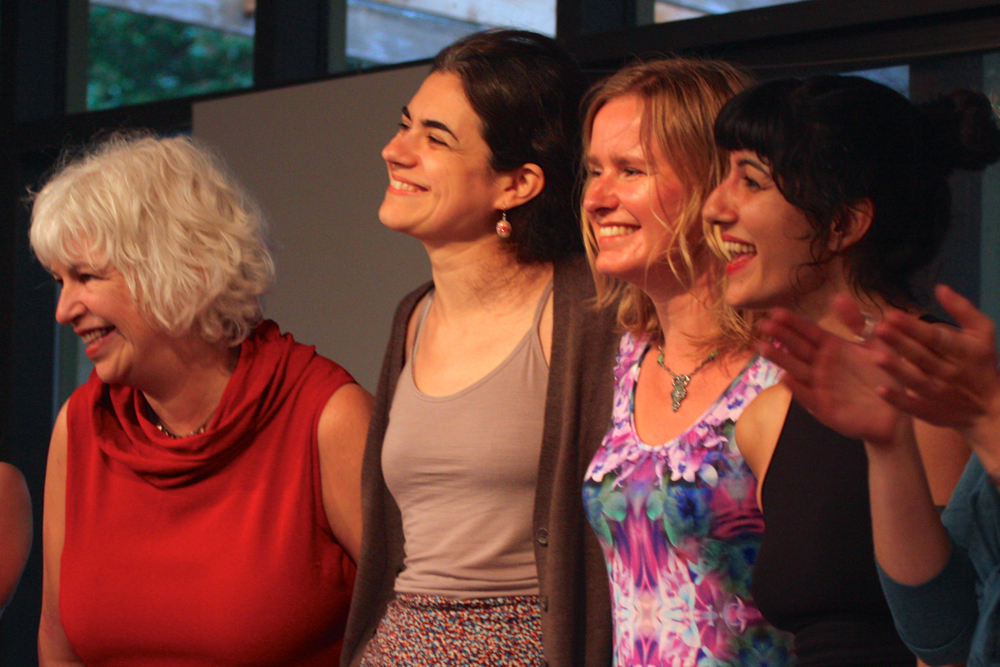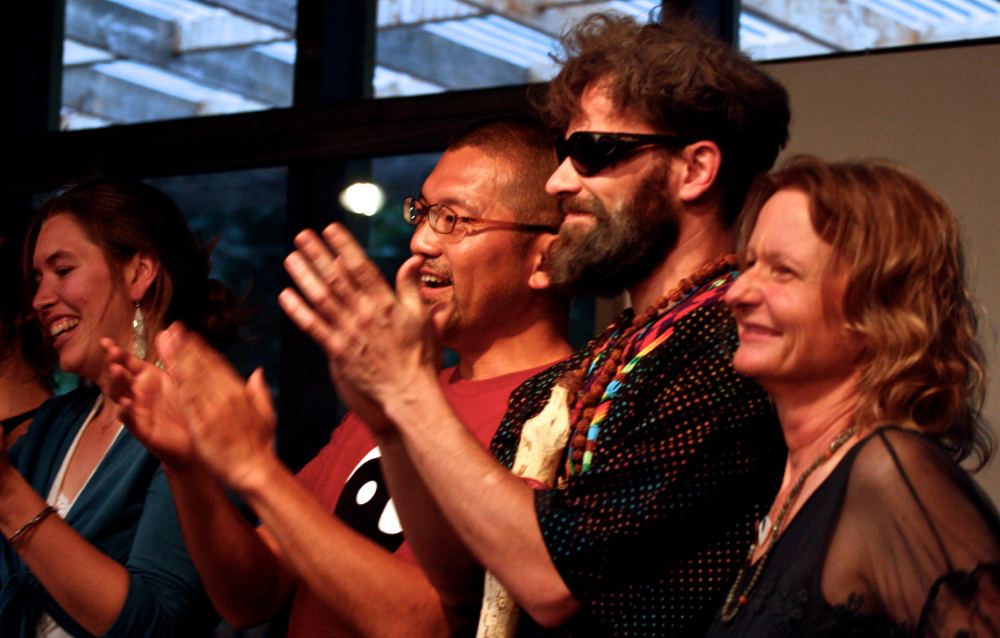Commencement Address for the Graduates of Cohort 3, Masters in Processwork, may 23, 2015
I am delighted to be here and it is a privilege to be in this role and speak about this glorious group of people. This is my first commencement speech, so bear with me. Let’s hope I can pull it off!
Tonight is a chance to celebrate, not just this cohort, but the entire Processwork learning community. It takes a community to raise a Processworker, so without you—the community-- this couldn’t be happening. Thank you.
Before I speak to the cohort, I want to give a shout out to some of the groups that have supported this cohort.
- Arny and Amy Mindell, the creators of this amazing theory and practice. They are the founders, elders and the spiritual backbone of the school. Without their original research and teaching, without their inspiration and their deep belief in dreaming, we wouldn’t have a theory to teach.
- Guests of the graduates. The family and friends in the room and from all over the world who are streaming. Welcome and thank you for being here today and over the past 4 years. I’m sure these students have “experimented” with their skills and “practiced” their personal growth on you. It may not have always been easy. Thank you for hanging in there as they possibly turned your relationships upside down. We appreciate you
- The Processwork community. Many of you in the room have supported this cohort by being supervision clients, exam clients, group process participants. You have had deep experiences, difficult experiences, chaotic experiences and completely inexplicable experiences. Sometimes they were profound and occasionally just confusing. And you kept coming back. Thank you. We couldn’t have a formal school without all of your informal support.
- Cohorts past, present and future. This is the 4th graduating cohort from the MAPW program. Stand up. It’s great to look at you!
- Ingrid Rose, MAPW Dean and Chris Allen, PWI President, for taking over in middle of huge transition. You had no idea what you were getting into. Stand up. Hellene Gronda, Dean of Research and Development, please stand up. Hellene is responsible for the nitty gritty work of getting us accredited. And huge thanks to Myriam Rahman, Admissions and Outreach Coordinator, who does a superb job turning people on to the Processwork programs
- The office staff: Jim Stillwell, Annie Blair, Annie Donnehy, Theresa Magno-Mendoza. Thank you.
- The original team that birthed and held the MAPW in its early iterations, especially Julie Diamond and Stephen Schuitevoerder—We appreciate you!
- Last but not least, The Faculty. You will never meet a faculty more dedicated than this one. They come out for group and community processes, meetings, parties, presentations. They are as dedicated to helping these students grow and develop, as they are to their own personal and professional development. And they are committed to being honest with each other, to having conflicts and trying to work them through. Many of us have stuck together over more than 20 years, some 30 years. Faculty, please stand up!
This is the village that has raised these Processworkers!
And to you, the graduates: Venetia Bouronikou, Daiki Hayashi, Gayatri, Mary Joy, Lynn Lobo, Anne Murphy, Reet Neemoja, Wendy Ormiston, Dennis Palazzolo, Katerina Sideri, Christa Strotz, Ioanna Velali. I have some thank yous for you.
Thank you for coming to study with us. We have been enriched by your creativity, your intelligence, and your heart.
Thank you for your patience and tolerance. You have seen PWI through a period of great change and transition. And yes, we do say that to every cohort! But especially you! Together with you, we have become more formalized in all that we do from courses, to assignments, to grading. And it all happened during your first year of study. You entered one program and like magic, very messy magic, it became another one. You were expected to learn and master Sakai, our Learning Management System, together with your teachers, who were learning it at the same time and couldn’t be much help.
Your personal development and your skills prove that Processwork can be taught in an atmosphere where grades are given, assignments must be submitted and exams are passed or failed. You have shown us it is possible to have a formal school and still keep relationship and community at the core of what we do.
From a purely administrative point of view, the path hasn’t been without its challenges-- you have been patient, impatient, understanding, angry, loving and most of all process-oriented! You have taken your own side—and you have understood the other side. You have done so with each other, the faculty and the office, with me when I was Dean during your first year and then with Ingrid.
Thank you for your generosity and kindness.
Thank you for thinking so deeply about Process Work and adding to the body of research and knowledge through your final projects.
Many of us had the privilege to learn from you during your final project presentations this last week.You used your own personal and cultural stories, your challenges and difficulties and you made or are in the process of making them educational and meaningful for us. You were transparent and brave.
You researched topics ranging from near death experiences to trauma to serious illness to clowning to power to how to use your childhood dream to inform your path as a therapist. You took us into game development, sweat lodge, and sex work. You showed us your naked selves—yes, sometimes literally. You made or are in the process of making art. An illustrated handbook. Visually stunning and outrageous films that portray the essence of PW. You even painted sensitive water colors of childhood dream patterns as seen through the eyes of cockroaches.
Susan Kocen said it best—with you, with cohort 3, PW is entering its avant-garde phase.
You created for each other what you describe as an “especially weird container.” This container loves you in all of your eccentricity and far-out-ness. This container supported you to be original, inventive, risk taking and to push the boundaries of what is normal or usual in a serious psychological training program.
You have some special gifts and quirks.
We threw you together for you off-sites, 12 people from diverse countries, cultures and backgrounds, and expected you to figure out how to live together in one big house. Did you make this easier for yourselves? Did you figure out what works, and then repeat it? No. You decided to never stay in the same house twice. You insisted on having new experiences and finding new locations even when it meant constantly wrestling with one another, wrestling with rank issues and power dynamics, class and cultural differences. Even when it meant risking the wrath of your teachers, who never knew where they would be heading next. I’ll never forget Suzette and I—she with macular degeneration and me with my extreme myopia—risking our lives on dark roads to reach you in a far-flung fields in the middle of nowhere.
Your kitchens overflowed with food from many cultures and cuisines. You cooked amazing meals and sat around large tables, sometimes feasting, sometimes fighting, sometimes fighting off ants and other creatures, eating each other up in so many ways, sometimes bitter, sometimes spicy, sometimes sweet, always nourishing.
You insisted on hearing juicy stories and forbidden gossip about your teachers, about Processwork history, about the antics and adventures that went on in Zurich and over the generations. Who did what with whom and when and where? You relished being part of a tribe whose relationship history is as important as its spiritual and intellectual lineage.
And you’ve made some juicy stories of your own. I won’t go into the details here, and I’m sure I don’t know the half of it. But I do know that birth and death has been central in it all.
During your first residency one of you witnessed a woman giving birth on the street. The story stuck. What would this cohort give birth to? What births are still to come?
Several of you lost parents and grandparents during your 4 years together. Anne’s mom and dad and Reet’s grandma have passed. We have met them in spirit and they have been a part of us. Christa’s dad and Lynn’s grandma are in their final days right now, as you are also passing to another phase. May they go into the other world well, as you pass into your next life phase. One of you was convinced that you wouldn’t survive the program—not because of your study committee or exams, but because of your serious health struggles. And all of you have not just survived, but you have each triumphed in your own way.
So, here’s what I hope for you
What I hope is that each of you can create an atmosphere inside of yourself that is as beautiful as the atmosphere you have created with each other.
What I hope is that you believe in yourselves and that you know that this cohort (and this community) lives within each of you. All of the creativity, love, skill, talent, diversity, all of the capacity for conflict and transformation, that you have created together, exists within each of you.
What I hope is that you continue to mess up. A lot. The training has not been easy. It’s been hard, really hard. And sometimes your worked sucked. And you knew it. And sometimes our teaching sucked. And we knew it. And while I as a teacher may not have always admitted it when I faltered, you as a student had to. You were always expected to rise to the occasion and face your growing edges, your biggest obstacles, look them squarely in the face and be open to feedback and learning. And for that, more than anything else, I honor you.
I hope that you will continue to take risks that bring you into unknown territories and into areas where you can’t possibly do well. Where no one can do well because the challenges of our world are so great that the best we can do is try, and try again, and learn from our mistakes.
What I hope is that you pursue your dreams and aspirations, regardless of how strange or crazy or out there they are, and that you take this training and use it to make an impact. The world needs you.
And if you work with the conflicts and the pressures inside you and around you, the world that may continue to try to tell you that things have to be done a certain way, that particular people or groups or situations are too extreme or hopeless and can’t be worked with, that we have to “act professional,” not show our feelings, not be too dreamy or altered, not show who we really are or what we really care most deeply about. If you can discern what is truth and what is noise, if you stay true to the essence of who you are, stay close to your own dreaming and remain connected to the radical, renegade, daring and artistic spirit behind Processwork, you can do anything.
To quote Michelle Obama, speaking to the graduates of Tuskeggee University a few weeks ago,
You’ve got everything you need right now inside you. Can’t wait to see how high you soar!”
Thank you Cohort 3! You are an inspiration



